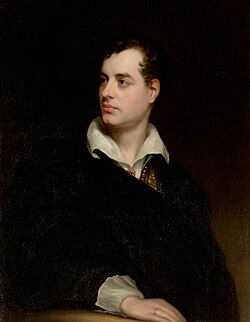
Back Lord Byron Afrikaans George Gordon Byron ALS ሎርድ ባይረን Amharic Lord Byron AN جورج غوردون بايرون Arabic جورج بايرون ARZ লৰ্ড বায়ৰন Assamese Lord Byron AST Джордж Байрон AV Lord Byron Aymara
The Lord Byron | |
|---|---|
 Portrait of Lord Byron (c. 1813) | |
| Born | George Gordon Byron 22 January 1788 London, England |
| Died | 19 April 1824 (aged 36) Missolonghi, Aetolia, Ottoman Empire (present-day Aetolia-Acarnania, Greece) |
| Resting place | Church of St. Mary Magdalene, Hucknall, Nottinghamshire |
| Occupation |
|
| Alma mater | Trinity College, Cambridge |
| Spouse | |
| Partner | Claire Clairmont |
| Children | |
| Parents |
|
| Signature | |
 | |
| In office 13 March 1809 – 19 April 1824 Hereditary peerage | |
| Preceded by | The 5th Baron Byron |
| Succeeded by | The 7th Baron Byron |
George Gordon Byron, 6th Baron Byron (22 January 1788 – 19 April 1824) was an English poet.[1][2] He is one of the major figures of the Romantic movement,[3][4][5] and is regarded as being among the greatest British poets.[6] Among his best-known works are the lengthy narratives Don Juan and Childe Harold's Pilgrimage; many of his shorter lyrics in Hebrew Melodies also became popular.
Byron was educated at Trinity College, Cambridge, before he travelled extensively in Europe. He lived for seven years in Italy, in Venice, Ravenna, Pisa and Genoa after he was forced to flee England due to threats of lynching.[7] During his stay in Italy, he would frequently visit his friend and fellow poet Percy Bysshe Shelley.[8] Later in life, Byron joined the Greek War of Independence to fight the Ottoman Empire, for which Greeks revere him as a folk hero.[9] He died leading a campaign in 1824, at the age of 36, from a fever contracted after the first and second sieges of Missolonghi.
His one legitimate child, Ada Lovelace, was a founding figure in the field of computer programming.
- ^ McGann, Jerome (2004). "Byron, George Gordon Noel, sixth Baron Byron (1788–1824), poet". Oxford Dictionary of National Biography (online ed.). Oxford University Press. doi:10.1093/ref:odnb/4279. ISBN 978-0-19-861412-8. Retrieved 8 February 2021. (Subscription or UK public library membership required.)
- ^ "Lord Byron". The British Library. Archived from the original on 15 July 2014. Retrieved 17 October 2020.
- ^ Marchand, Leslie A. (15 April 2019). "Lord Byron". Lord Byron | Biography, Poems, Don Juan, Daughter, & Facts. Encyclopædia Britannica. London: Encyclopædia Britannica, Inc.
- ^ "Byron and Scotland". Robert Morrison.com.
- ^ "Lord Byron (George Gordon)". Poetry Foundation. 30 December 2018. Retrieved 30 December 2018.
- ^ "The Nation's Favourite Poet Result – TS Eliot is your winner!". BBC. Retrieved 25 May 2019.
- ^ Poets, Academy of American. "About George Gordon Byron | Academy of American Poets". poets.org. Retrieved 5 November 2022.
- ^ Perrottet, Tony (29 May 2011). "Lake Geneva as Shelley and Byron Knew It". The New York Times.
- ^ "Byron had yet to die to make philhellenism generally acceptable." – Plomer (1970).